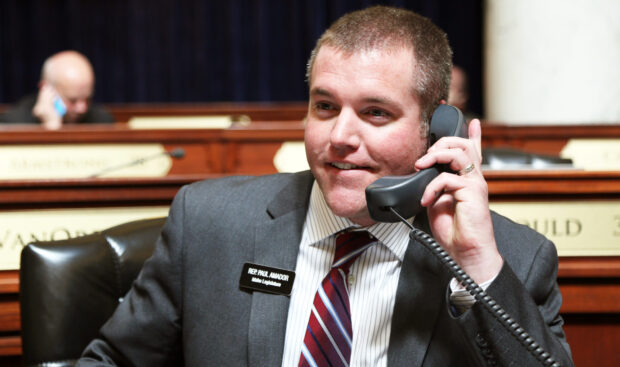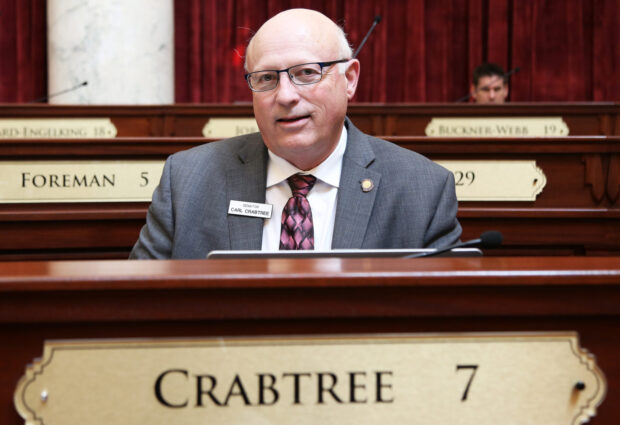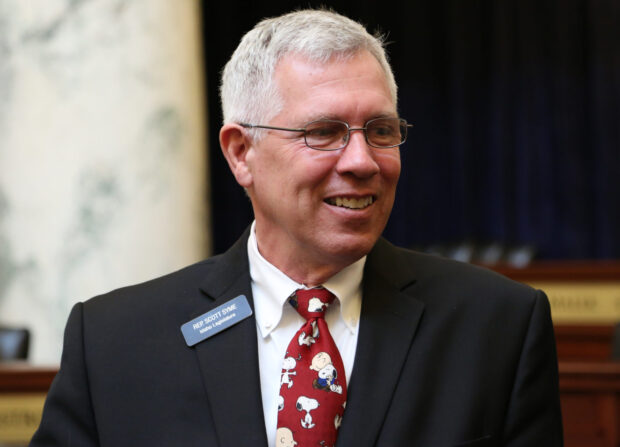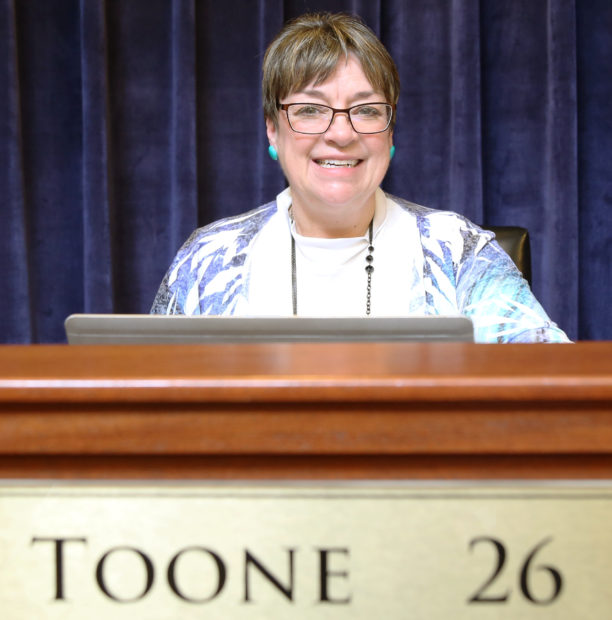Just like in school, the Idaho’s Legislature’s freshman class starts at the bottom.
First-year lawmakers don’t get to serve in leadership.
Newbies don’t get to lead committees.
And they sometimes make rookie mistakes.
But, just like in school, there is a learning curve. And just because they are the new kids on the block doesn’t mean freshmen don’t make an impact — especially if they team up with more established lawmakers.
Meet four freshman lawmakers who played a role in education issues this year at the Statehouse.
Rep. Paul Amador
- Republican from Coeur D’Alene
- Day job: Administrator at University of Idaho.
- Member of the House Education Committee

Even though Amador is one of the younger members of the House, he employed an old-school mindset. He was only partially joking when he said his first-year priorities were to keep his head down, learn his business and keep his name out of the headlines.
“There is an enormous amount of information and protocol you just don’t recognize from the outside,” he said.
Perhaps the thing that surprised Amador most was all the demands on his time. As a legislator, he was assigned to three committees, responsible for making floor votes on about 500 bills (which he needed to be up to speed on), interact with constituents and then close out the day with an endless list of legislative social and networking events.
“There was certainly nothing I really felt like I was overwhelmed by, as far as the difficulty of the content,” Amador said. “It was mostly the quantity of the content.”
During the session, Amador said he looked to two young but established lawmakers as mentors — House Education Chairwoman Julie VanOrden and his legislative seatmate Rep. Luke Malek, R-Coeur d’Alene.
Amador demonstrated his independence early on. Before lawmakers removed five references to human impact on the environment and climate change from school science standards, Amador tried unsuccessfully to keep the standards intact. Amador said he has no problem teaching both sides of the climate debate. Rather, he simply trusted the Idaho teachers who developed the standards and wanted to remove politics from the equation by supporting their work in its entirety.
Looking back, Amador described his work this year as fun and rewarding and said he developed respect for many of his House colleagues. The best piece of legislative advice he has received so far is to keep in mind that at some point he is likely to agree with each member of the House, while at another point he is likely to disagree with each member of the House.
“Even if I disagree with them ideologically on most issues, I truly believe they are here for the right reasons and want to make Idaho a better place for the citizens,” Amador said.
Sen. Carl Crabtree
-

Sen. Carl Crabtree Republican from Grangeville
- Day job: Rancher.
- Member of the Senate Education Committee and the Joint Finance-Appropriations Committee.
It’s not uncommon for first-term lawmakers to get assigned to an education committee.
It is uncommon for a newbie to get a seat on the Joint Finance-Appropriations Committee — the powerful and detail-oriented panel that spends weeks sifting through agency requests and presentations before writing budget bills.
Crabtree wound up with both assignments. And he says Senate Education was the tougher job.
“It’s so complex, and so huge,” he said. “It’s almost more overwhelming than the JFAC experience, because of the nuance.”
Like his colleagues on Senate Education, Crabtree found himself embroiled in the science standards debate. His constituent emails ran overwhelmingly in support of the standards in their unedited form — with references to climate change left intact. Many constituents weren’t sure what lawmakers were thinking when they deleted climate change from the standards, and Crabtree says they weren’t shy about saying so.
Crabtree believes the process will work. The science standards are only temporary, and he says that gives lawmakers and educators time to get it right.
“At the end of the day, we’re going to work out a solution that’s going to be better for everybody,” he said. “The intent was to get more people on board.”
Crabtree represents one of Idaho’s most far-flung legislative districts, stretching from sprawling Idaho County to the Panhandle’s Shoshone and Bonner counties. And he need only look within his district to see firsthand the funding challenges facing Idaho school districts.
During his campaign, Crabtree toured schools in Kamiah. He met with one of the district’s most popular teachers, a teacher nearing retirement. Crabtree was struck by the teacher’s refurbished classroom. When Crabtree was on the eighth grade basketball team, that same room was the school locker room.
Crabtree doesn’t know what the solution is for districts that struggle to pass ballot measures — districts such as Kamiah. But the problem is plain to see. “There’s something wrong with that picture.”
Rep. Scott Syme
- Republican from Caldwell
- Day job: Commercial real estate broker; retired member of the U.S. Army Reserve.
- Member of the House Education Committee
Syme made headlines this year by leading the effort to remove the climate change references from the science standards.

But Syme said he was misunderstood because many people never looked beyond the headlines. He said he always knew the science standards would need to come back to the Legislature in 2018, and he wanted to ensure they told both sides of the story before they are finalized.
“For me it wasn’t about climate change,” Syme said. “It was about just human interaction with the environment. I said, ‘We all understand humans can do bad things, let’s talk about some of the science behind how we mitigate those bad things.’”
Syme has received endless feedback on the standards, and even picked up a tongue-in-cheek nickname from some House colleagues — Scott Syme science guy.
But for Syme, education wasn’t his most pressing issue. He worked alongside other Canyon County legislators right up to the very end of the session to help secure passage of a transportation package to address Interstate 84 and other Canyon County roads.
“That was critical,” Syme said. “This winter has just been devastating. We were are all unified and said, ‘This is what we want.’”
Next year on the education front, Syme hopes to become involved with Idaho’s push to create a true mastery-based system of education, where students advance through school based not on seat time, but on their command of lessons and concepts.
Rep. Sally Toone
- Democrat from Gooding
- Day job: Recently retired teacher with 37 years of classroom experience. Her family also owns a farm.
- Member of the House Education Committee
Toone called her assignment on the House Education Committee “a dream come true.”

“I had hoped to be assigned to the education committee,” she said. “I knew a lot about the budget and the laws and how the education committee had worked, so there wasn’t too much of a learning curve. It was exciting to be on the inside of that.”
Toone’s ran for — and won — the legislative seat held by her longtime friend, retired Rep. Donna Pence. And Toone picked up where Pence left off, pushing for a bill to forgive student loan debt for new teachers who take jobs in Idaho’s rural school districts. The bill got sidetracked late in the session, but Toone said she would continue to fight to recruit and retain teachers in small districts.
“It’s a tool in our toolbox for education, and we need the teachers,” Toone said.
After 80 days in session, one thing that surprised Toone was the slow legislative process. She was frustrated to see the Legislature’s wait-and-see attitude and to watch her colleagues talk about how certain issues would be better addressed in coming years.
In Toone’s mind, voters sent her to Boise to get work done, not to kick the can down the road.
“I think that comes from my teacher’s perspective,” Toone said. “Dang it! Get your homework done and let’s get this process going. This hurry-up-and-wait drives me nuts. You have a job to do, so let’s get it done.”
Now that her first session is under her belt, Toone has one piece of advice for fellow educators — your voice matters, make sure the Legislature hears it.
“It takes all of us to run the state of Idaho,” she said. “We here in Boise have to hear from our home constituents.”
Idaho Education News reporter Kevin Richert contributed to this report.
